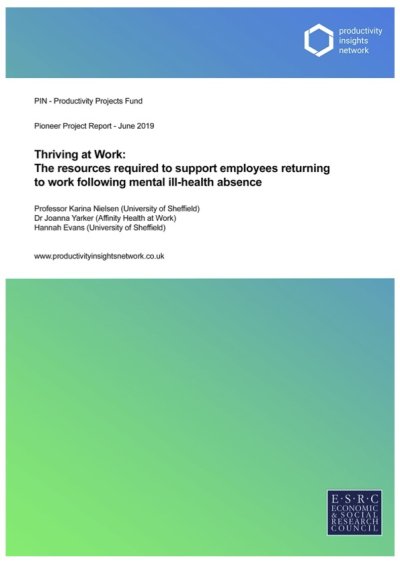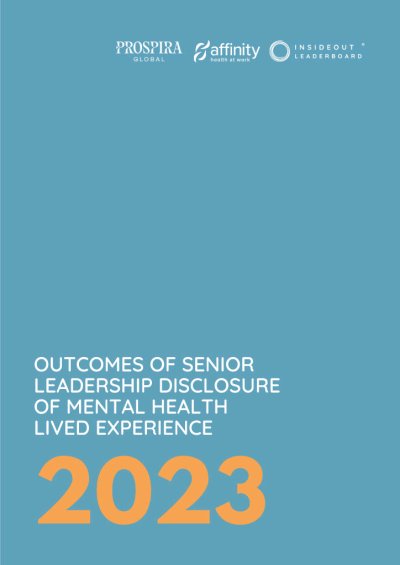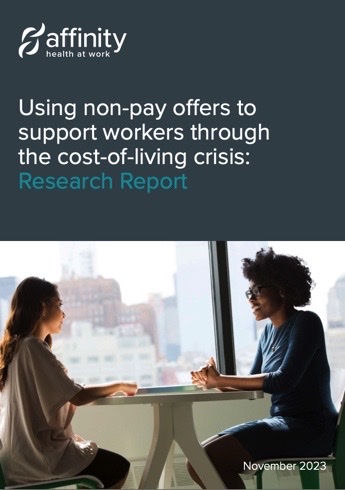Displaying 1 to 26 of 26
Management Competencies For Preventing And Reducing Stress At Work: Identifying And Developing The Management Behaviours Necessary To Implement The HSE Management Standards (PDF, 1.2 Mb)
Management Competencies For Preventing And Reducing Stress At Work: Identifying And Developing The Management Behaviours Necessary To Implement The HSE Management Standards
Tue, 1 Jan 2008
HSE
This report presents the findings of the second phase of a research project to identify the specific management behaviours associated with the effective management of stress at work. This phase aimed to: examine the usability of the 'Management competencies for preventing and reducing stress at work'...
Developing Resilience: Research Insight (PDF, 497 Kb)
The overall aim of this report is to assist practitioners in understanding resilience and approaches to building resilience, as well as identifying gaps in these domains. Additional objectives include: to review interventions designed to build resilience offered both by practitioners and by the academic...
Preventing Stress: Promoting Positive Manager Behaviour Phase 4: How Do Organisations Implement The Findings In Practice? (PDF, 498 Kb)
Preventing Stress: Promoting Positive Manager Behaviour Phase 4: How Do Organisations Implement The Findings In Practice?
Mon, 25 Jul 2011
CIPD
Our research highlights the pivotal role that line managers play in workplace stress management. For employers to reduce and manage workplace stress effectively they need to ensure that managers demonstrate the skills and behaviours that allow them to manage their staff in ways that minimise work-related...
Managing for Sustainable Employee Engagement Developing a Behavioural Framework (PDF, 759 Kb)
Managing for Sustainable Employee Engagement Developing a Behavioural Framework
Sun, 1 Jan 2012
CIPD
Although it is widely accepted by both academics and practitioners that employee engagement has a significant and positive impact on both the organisation and the individual, there is no general consensus on the conceptualisation of employee engagement.
This research aims to define employee engagement...
Managing For Sustainable Employee Engagement: Developing A Behavioural Framework (PNG, 1.3 Mb, 968x1378)
Managing For Sustainable Employee Engagement: Developing A Behavioural Framework
Thu, 13 Dec 2012
CIPD
Evidence suggests that employee engagement has a positive and significant effect on organisations, and that managers are pivotal to engagement and wellbeing.
Research, funded by the CIPD and led by Affinity Health at Work through a consortium of employers and other stakeholders, has brought together two...
Developing Managers To Manage Sustainable Employee Engagement, Health And Well-Being - Phase One (PDF, 2.6 Mb)
Developing Managers To Manage Sustainable Employee Engagement, Health And Well-Being - Phase One
Sat, 1 Nov 2014
CIPD
Sponsored by the CIPD, Institution of Occupational Safety and Health (IOSH) and the Affinity Health at Work Research Consortium, Affinity Health at Work has conducted research to review all the evidence available about what affects the success of developing managers who support employee engagement, health...
Thriving at work: The resources required to support people returning to work following mental health sickness absence
Sat, 1 Jun 2019
ESRC Productivity Insights
This report provides an overview of the resources required to support people returning to work following mental health sickness absence Sustainable return to work is a challenge in the UK and beyond, with too many people existing the workplace following an initial return.
We conducted semi-structured...
Cross-Sector Insights On Enabling Flexible Working (PDF, 1.3 Mb)
Growing demand for flexible working and an increasing recognition of its broad benefits have pointed to the need for practical, evidence-based guidance to help people professionals and their organisations to implement it.
This CIPD guide, produced in collaboration with Affinity Health, explores the effective...
Thriving at Work: The resources required to support employees returning to work following mental ill-health absence (PDF, 1.1 Mb)
Thriving at Work: The resources required to support employees returning to work following mental ill-health absence
Sat, 15 Jun 2019
Productivity Projects Fund
Sustainable return to work (SRTW) for workers with common mental disorders (CMDs) presents a major societal challenge in terms of scale and costs. Approximately 15% of the working population suffer from CMDs such as depression, anxiety and adjustment disorders (OECD, 2014) and for 50% their experience...
Keeping Business Travellers Healthy, Happy And Engaged At Home And Away (PNG, 768 Kb, 1654x2339)
Despite international business travel being seen as essential for global business and indeed advantageous in term of career progression for employees; there is evidence that international business travel can be deleterious to health. The study not only uncovers the psychological implications of business...
Work Adjustments For Mental Health Work Adjustments: A Review Of The Evidence And Guidance for Acas (PNG, 381 Kb, 794x1123)
Work Adjustments For Mental Health Work Adjustments: A Review Of The Evidence And Guidance for Acas
Fri, 12 Jun 2020
ACAS
This review examines the evidence and guidance available to inform practices around work adjustments for mental health at work.
It is important that employees experiencing mental ill-health are able to access the support they need to return to work following sickness absence, stay in work and continue...
Learnings From The Covid-19 Pandemic: Approaches To Support Employee Health And Wellbeing (PDF, 769 Kb)
Learnings From The Covid-19 Pandemic: Approaches To Support Employee Health And Wellbeing
Fri, 1 Jan 2021
IOSH
This research was conducted by Affinity Health at Work, co-sponsored by IOSH via its Research Consortium, to explore the impact the COVID-19 pandemic on employee's health and wellbeing and what can be learned from it.
Researchers conducted interviews and held focus groups with employees, managers and...
The Psychological Implications Of Remote Rotational Work (PNG, 621 Kb, 1104x1430)
Whether on or offshore, the work and lifestyle of a remote rotational worker is unique. While lucrative for some, it has long been associated with a high impact on mental health and wellbeing. To reveal the true extent of this, the International SOS Foundation commissioned a ground-breaking global study...
Impact Of Covid-19 On The L&D Profession: Perspectives From Independent Learning Practitioners. (PDF, 783 Kb)
Impact Of Covid-19 On The L&D Profession: Perspectives From Independent Learning Practitioners.
Mon, 22 Mar 2021
CIPD
The COVID-19 pandemic has dramatically shifted the way we learn. Learning and development practitioners have been challenged to step outside of their comfort zone, be curious and embrace new ways of delivering learning with high impact for the digital age. This longitudinal focus group study investigated...
What If Your Job Was Good For You? A Once-In-A-Lifetime Opportunity To Make Work Better (PDF, 6.4 Mb)
What If Your Job Was Good For You? A Once-In-A-Lifetime Opportunity To Make Work Better
Wed, 30 Jun 2021
BITC
Business in the Community's (BITC) What If Your Job Was Good For You? report identifies actions employers can take to transform wellbeing at work. The report sets out how business leaders can create an environment in which employees feel supported to do their best work. It also outlines how to achieve...
Working With Long Covid: Research Evidence To Inform Support (PDF, 319 Kb)
An estimated 1.3 million people (1.9% of the population) were experiencing self-reported long COVID as at October 2021. The prevalence and impact of long COVID is emerging as a significant concern and needs ongoing attention from people professionals.
In order to provide timely and appropriate support...
Developing an Understanding of Moral Injury in Business Settings (PDF, 584 Kb)
Developing an Understanding of Moral Injury in Business Settings
Mon, 30 May 2022
Affinity Health at Work
Moral injury refers to the lasting strong cognitive and emotional response that is caused by performing, witnessing, or failing to prevent an action that violates one's own moral beliefs and expectations (Litz et al., 2009; 2019). Typically, moral injury research has been conducted within military settings,... |
Developing an Understanding of Moral Injury in Business Settings Summary (PDF, 240 Kb)
Developing an Understanding of Moral Injury in Business Settings Summary
Mon, 30 May 2022
Affinity Health at Work
Moral injury refers to the lasting strong cognitive and emotional response that is caused by performing, witnessing, or failing to prevent an action that violates one's own moral beliefs and expectations (Litz et al., 2009; 2019). Typically, moral injury research has been conducted within military settings,... |
Your Job Can Be Good For You (PDF, 5 Mb)
We were pleased to be BITC's research partner to create the 'Your Job Can Be Good For You' report which sets out how businesses can revolutionise the way employees work while supporting broader responsible business goals. It also includes recommendations to begin post-pandemic re-sets of employee wellbeing...
Long COVID and Return to Work - What Works? A position paper from the Society of Occupational Medicine (PDF, 685 Kb)
Long COVID and Return to Work - What Works? A position paper from the Society of Occupational Medicine
Thu, 4 Aug 2022
Society of Occupational Medicine
This paper provides guidance on the identification and management of Long COVID - particularly regarding return to work. This guidance has been produced by members of The Society of Occupational Medicine Long COVID Group, of which our Managing Partner Jo Yarker is a member, and other work and health...
Managing duty of care for wellbeing within a hybrid workforce (PDF, 1.7 Mb)
Managing duty of care for wellbeing within a hybrid workforce
Tue, 1 Nov 2022
International SOS Foundation
Remote working has become increasingly common in the modern workforce, hugely accelerated by the COVID-19 pandemic, meaning that support for wellbeing in organisations has had to adapt to a new context. The aim of this research, carried out by Affinity Health at Work on behalf of the International SOS...
Digital Mindsets Summary Report (PDF, 120 Kb)
Digital Mindsets Summary Report
Wed, 14 Dec 2022
The Digital Mindsets project aims to develop our understanding of people's attitudes and beliefs regarding technology and change in the workplace (their digital mindset) and use this understanding to help support people through change, thus ensuring a more inclusive workplace.
Affinity Health at Work...
Introduction to the Working Well Maturity Framework (PDF, 1.1 Mb)
Introduction to the Working Well Maturity Framework
Tue, 11 Apr 2023
The rapid increase in the number of wellbeing frameworks available has given rise to a bewildering choice for organisations. The Working Well Maturity Framework was developed in response to calls from Affinity's Research Consortium, to develop a clear picture on how frameworks differ and to develop a...
Outcomes of Senior Leadership Disclosure of Mental Health Lived Experience
Speaking out on mental health and 'leading by example' is often easier said than done. For those who consider share their experience, the worries round vulnerability, stigma and being judged have historically often been justified. This report examines the research evidence on the outcomes of senior leader...
Supporting employees with non-pay offers through the cost-of-living crisis (PDF, 1.4 Mb)
Supporting employees with non-pay offers through the cost-of-living crisis
Wed, 8 Nov 2023
Affinity Health at Work
The 'cost-of-living crisis', defined as the fall in 'real' disposable income that the UK has been experiencing since late 2021 is having a profound impact on the nation. Inflation reached a 40 year high in October 2022 (ONS, 2022a) and the fiscal year 2022-23 saw the biggest one-year fall in living standards...
The business case for investing in health and wellbeing (PDF, 708 Kb)
The business case for investing in health and wellbeing
Thu, 8 Feb 2024
Taking an integrated approach to mental health and wellbeing brings gains to health, performance and retention. We provide a summary of the latest research and share cost calculations you can use to estimate the overall cost of poor mental health in your organisation. Our review shows that investing...















































